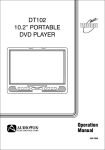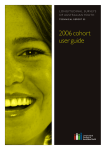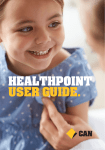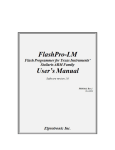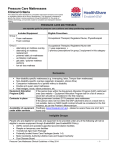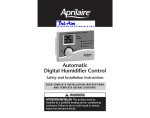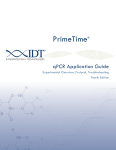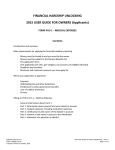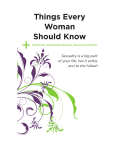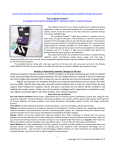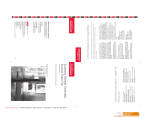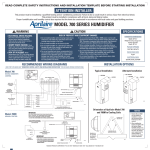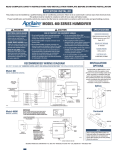Download EASY USER GUIDE - Sunnyfield Independence
Transcript
EASY USER GUIDE Benefits and Allowances for People with a Disability as at January 2012 (Source: NSW Ageing Disability and Homecare and Centrelink) 1|Page Benefits and Allowances: 19 January 2012 CONTENTS ADHC Information, Referral and Intake ................................................................................................ 3 CARER ALLOWANCE ............................................................................................................................ 4 CARER PAYMENT................................................................................................................................. 4 DISABILITY SUPPORT PENSION ........................................................................................................... 5 MOBILITY ALLOWANCE ....................................................................................................................... 5 PENSIONER CONCESSION CARD.......................................................................................................... 6 PENSIONER EDUCATION SUPPLEMENT .............................................................................................. 7 PHARMACEUTICAL ALLOWANCE ........................................................................................................ 8 RENT ASSISTANCE ............................................................................................................................... 8 SICKNESS ALLOWANCE........................................................................................................................ 9 YOUTH DISABILITY SUPPLEMENT ........................................................................................................ 9 DISABILITY AND CARER PAYMENT RATES ......................................................................................... 10 MEDICARE ............................................................................................................................................. 11 GETTING THE MOST OUT OF MEDICARE .......................................................................................... 11 ANNUAL HEALTH ASSESSMENTS....................................................................................................... 13 SPECIALISED INTELLECTUAL DISABILITY HEALTH SERVICES .............................................................. 14 ADULTS WITH INTELLECTUAL DISABILITY – WHAT KINDS OF HEALTH SERVICES ARE THERE? ......... 16 CHILDREN WITH INTELLECTUAL DISABILITY – WHAT KINDS OF HEALTH SERVICES ARE THERE? ..... 18 DISABILITY EQUIPMENT - EnableNSW .............................................................................................. 21 NATIONAL RELAY SERVICE ................................................................................................................ 22 TAXI TRANSPORT SUBSIDY SCHEME (TTSS) ...................................................................................... 22 COMPANION CARDS ......................................................................................................................... 23 Aboriginal and Torres Straits Islander (ATSI) or Culturally and Linguistically Diverse (CALD) ......... 24 INDIGENOUS CALL CENTRES ............................................................................................................. 24 RESOURCES FOR ABORIGINAL PEOPLE ............................................................................................. 24 TRANSLATING AND INTERPRETING SERVICE (TIS) NATIONAL FOR NON-ENGLISH SPEAKERS .......... 25 2|Page Benefits and Allowances: 19 January 2012 Ageing, Disability and Home Care (ADHC) ADHC Information, Referral and Intake For all funded NSW Day Programs, Community Participation, Individualised Funding, ActiveAgeing, Supported Accommodation, Respite and other ADHC NSW services contact the Information, referral and intake officer in your Region: ADHC Region Contact details Metro South Phone: (02) 9334 3700 covers Sydney, Strathfield, Bankstown... [email protected] see all Metro North covers Parramatta, Blue Mountains, Ryde... see all Phone: (02) 9841 9350 [email protected] Hunter covers Gosford, Newcastle... see all Toll free: 1300 205 268 Phone: (02) 4978 6222 [email protected] Level 5, 670 Hunter Street Newcastle West NSW 2302 Northern covers Lismore, Coffs Harbour, Armidale... see all Toll free: 1300 364 563 Phone: (02) 6621 1400 Level 56/29 Molesworth Street Lismore 2480 [email protected] Southern covers Wollongong, Queanbeyan... see all Toll free: 1300 841 566 Phone: (02) 6128 9200 Fax: (02) 6128 9211 [email protected] Toll free: 1300 134 450 Phone: (02) 6841 1594 Western Fax: (02) 6841 1591 covers Lithgow, Dubbo, Albury... see all [email protected] Level 1 130 Brisbane Street Dubbo NSW 2830 3|Page Benefits and Allowances: 19 January 2012 Title CARER ALLOWANCE Eligibility Carer Allowance is a supplementary payment available for parents or carers who provide additional daily care to an adult or child with a disability or medical condition or someone who is frail aged. Carer Allowance is not subject to an income and assets test and is not taxable. It can be paid in addition to other income support payments such as Carer Payment or Age Pension. You may be eligible for Carer Allowance if you are caring for a child under 16 years of age with severe disability or medical condition, or if you are looking after someone aged 16 years or over with a severe disability or medical condition, or who is frail aged. Residential criteria also apply. Benefit Contact Web /email contact $110 per fortnight 13 27 17 http://www.centrelink.gov.au/internet/internet.nsf/payments/carer_allow_adult.htm Title Eligibility CARER PAYMENT Carer Payment can provide financial support if you are unable to work in substantial paid employment because you are providing full time care to a child or adult with a severe disability or medical condition or someone who is frail aged. Carer Payment is subject to an income and assets test and is paid at the same rate as other income support payments. You cannot receive Carer Payment and another income support payment, such as Age Pension, at the same time. Residential criteria also apply. You may be eligible for Carer Payment if you are caring for a child under 16 years of age with severe disability or medical condition, or if you are looking after someone aged 16 years or over with a severe disability or medical condition, or who is frail aged. Benefit Contact Web/email contact Single $689.00 per fortnight Couple $519.40 (each) per fortnight 13 27 17 http://www.centrelink.gov.au/internet/internet.nsf/payments/carer_rates.htm 4|Page Benefits and Allowances: 19 January 2012 Title Eligibility DISABILITY SUPPORT PENSION Disability Support Pension provides financial support to people with a physical, intellectual or psychiatric condition that prevents them from working, or for people who are permanently blind. Disability Support Pension provides financial support to people with a physical, intellectual or psychiatric condition that prevents them from working, or for people who are permanently blind. You may be able to get Disability Support Pension if you are ill, injured or have a disability. To do so you have to be an Australian resident and meet other eligibility criteria. The Disability Support Pension is income and assets tested. If you are eligible, you may receive a fortnightly Disability Support Pension, the Pharmaceutical Allowance and a Pensioner Concession Card. If you resume work, you can still receive the Disability Support Pension depending on the hours you work and how much you earn. Benefit Contact Web/email contact Title Eligibility Single $689.00 per fortnight Couple $519.40 (each) per fortnight 13 27 17 http://www.centrelink.gov.au/internet/internet.nsf/payments/disability_support.htm MOBILITY ALLOWANCE Mobility Allowance assists people with disabilities who are involved in qualifying activities and cannot use public transport without substantial assistance. Qualifying activities may include looking for work, or any combination of paid employment, voluntary work, vocational training and independent living or life skills training. Note: You do not need to get any other payments from Centrelink to qualify for Mobility Allowance. Mobility Allowance is not income or assets tested and is a nontaxable payment. Benefit Contact Web/email contact Standard rate $83 per fortnight Higher rate $116.20 per fortnight 13 27 17 http://www.centrelink.gov.au/internet/internet.nsf/payments/mobility_rates.htm 5|Page Benefits and Allowances: 19 January 2012 Title Eligibility PENSIONER CONCESSION CARD You can get a Pensioner Concession Card if you receive any of these payments: Age Pension Bereavement Allowance Carer Payment (adult) Carer Payment (child) Disability Support Pension Newstart Allowance or Youth Allowance (job seeker) if you are single, caring for a dependent child, and looking for work Parenting Payment (single) Benefit A Pensioner Concession Card entitles you to reduced cost medicines under the Pharmaceutical Benefits Scheme (PBS). You may also be entitled to various concessions from the Australian Government—these could include: bulk billing for doctor’s appointments (this is your doctor’s decision) more refunds for medical expenses through the Medicare Safety Net assistance with hearing services through the Office of Hearing Services discounted mail redirection through Australia Post Note: You may get some of these Australian Government concessions for a dependent child. You may also be entitled to various concession from State and Territory Governments and local councils—these could include: reductions on property and water rates reductions on energy bills a telephone allowance reduced fares on public transport reductions on motor vehicle registration free rail journeys Note: Pensioner Concession Card concessions are different in each State and Territory and vary between local councils. Contact Web/email contact 13 27 17 http://www.centrelink.gov.au/internet/internet.nsf/payments/conc_cards_pcc.htm 6|Page Benefits and Allowances: 19 January 2012 Title Eligibility Benefit Contact Web/email contact PENSIONER EDUCATION SUPPLEMENT Centrelink payment You may be eligible for Pensioner Education Supplement or ABSTUDY Pensioner Education Supplement if you are receiving one of these payments from Centrelink: Carer Payment (adult) Carer Payment (child) Disability Support Pension Parenting Payment (single) Special Benefit (as a single parent) Widow Allowance Widow B Pension Wife Pension (if your partner receives Disability Support Pension) Department of Veterans’ Affairs payment You may qualify for Pensioner Education Supplement or ABSTUDY Pensioner Education Supplement if you are receiving one of these payments from the Department of Veterans’ Affairs: Invalidity Service Pension Partner Service Pension (if your partner is receiving an Invalidity Service Pension) Partner Service Pension in combination with Carer Allowance (from Centrelink) You may also qualify if you have a dependent child and you receive: Defence Widow (or Widower) Pension Special Rate Disability Pension War Widow (or Widower) Pension weekly compensation under the Military Rehabilitation and Compensation Act. Other eligibility rules To be eligible for Pensioner Education Supplement or ABSTUDY Pensioner Education Supplement, you must also be: studying full-time, or a single parent, a carer, have a substantial disability or be an eligible student receiving Youth Allowance or Newstart Allowance and undertaking approved parttime study (part-time study is at least 25% of a full-time study load), and studying a secondary or tertiary approved course, including school and adult secondary courses, undergraduate and graduate courses, some Masters courses, TAFE certificate and diploma courses. Note: students can receive ABSTUDY Pensioner Education Supplement to undertake approved Masters and Doctorate courses. From $31.20 to $ 62.40 per fortnight 13 27 17 http://www.centrelink.gov.au/internet/internet.nsf/payments/pes.htm 7|Page Benefits and Allowances: 19 January 2012 Title Eligibility Benefit Contact Web/email contact PHARMACEUTICAL ALLOWANCE You are eligible for Pharmaceutical Allowance if you are receiving: Sickness Allowance, or Parenting Payment (single) and you are under age pension age, or Disability Support Pension and you are under 21 with no dependent children, or ABSTUDY , Newstart Allowance, Parenting Payment (partnered), Partner Allowance, Special Benefit or Widow Allowance or Youth Allowance if you have a temporary illness or medical condition, or ABSTUDY, Austudy , Newstart Allowance, Parenting Payment (partnered), Partner Allowance, Special Benefit, or Widow Allowance, have turned 60 years old but are under Age Pension age and have been receiving your payment continuously for at least 9 months, or Newstart Allowance, Parenting Payment (partnered), or Youth Allowance (as a job seeker) and have been assessed as having a partial capacity for work, or Newstart Allowance or Youth Allowance (as a jobseeker), are a single person who is the main carer of a dependent child. You must also meet the residence requirements of your main payment. Single$6 per fortnight; Couples $3 (each) per fortnight 13 27 17 http://www.centrelink.gov.au/internet/internet.nsf/payments/pharmaceutical.htm Title Eligibility Benefit Contact Web/email RENT ASSISTANCE You may be eligible for Rent Assistance if you: receive a pension (special rules apply if you are under 21 years and receive Disability Support Pension), or have dependent children and get more than the base rate of Family Tax Benefit, or have care of a child between 14% and 35% of the time and are not eligible for Family Tax Benefit but meet other Family Tax Benefit requirements, or receive an allowance or benefit (but don't have dependent children) and: are over 25 years, or have a partner, or are under 25 and living permanently or indefinitely apart from your parents or guardians. To receive Rent Assistance you must also meet the residence requirements of your pension, allowance, or benefit. Rent Assistance is generally not payable if you: have a tenancy agreement (lease) with a state or territory housing authority, or own or are buying the home in which you live (except for mobile and relocatable homes), or are a homeowner travelling away from your principal place of residence for less than 12 months, or occupy an Australian Government subsidised bed in an approved residential aged care facility, or have a partner who receives Rent Assistance with Family Tax Benefit, or are an allowee with a partner receiving Rent Assistance with their pension. From $79.60 per fortnight 13 27 17 http://www.centrelink.gov.au/internet/internet.nsf/payments/rent_assistance.htm 8|Page Benefits and Allowances: 19 January 2012 Title Eligibility SICKNESS ALLOWANCE You may be eligible for Sickness Allowance if you are unable to work or study temporarily because of illness, injury or disability. You also need to be under Age Pension age, and: aged 21 or over and have a job, or aged 21 or over and getting ABSTUDY, or aged 25 or over and getting Austudy, and an Australian resident, in Australia and not subject to the 2-year newly arrived resident's waiting period. You must have work or study to return to when you are better. Otherwise, you may be eligible for another payment from Centrelink, for example Newstart Allowance. Note: You need to get your doctor to fill out a medical certificate, preferably a Centrelink medical certificate, which confirms you are medically unfit for your usual work. Benefit Contact Web/email contact Title Eligibility single, no children $486.80 per fortnight single, with dependent child (or children) $526.60 per fortnight single, aged 60 or over (after 9 continuous $526.60 per fortnight months on payment) partnered $439.40 (each) per fortnight 13 27 17 http://www.centrelink.gov.au/internet/internet.nsf/payments/sick_eligible.htm YOUTH DISABILITY SUPPLEMENT You may be eligible for Youth Disability Supplement if you are: aged under 21 years, and receiving Disability Support Pension, or receiving Youth Allowance as a job seeker, full-time student, or Australian Apprentice, or receiving ABSTUDY as a full-time student or Australian Apprentice. If you are receiving Youth Allowance or ABSTUDY you must: have an illness, injury or disability which prevents you from working 30 or more hours per week and is expected to last for more than 2 years, and have a Job Capacity Assessment. Benefit Contact Web/email contact If you are receiving Disability Support Pension and you are under 21, the Youth Disability Supplement will be automatically included in your Disability Support Pension payment. $110 per fortnight 13 27 17 http://www.centrelink.gov.au/internet/internet.nsf/payments/disability_supplemen t.htm 9|Page Benefits and Allowances: 19 January 2012 Title Eligibility Benefit Contact Web/email contact DISABILITY AND CARER PAYMENT RATES FACT SHEET Disability and Carer Payment Rates– For Disability Support Pension/ Sickness Allowance/Mobility Allowance/ Carer Payment/Carer Allowance Various 13 27 17 http://www.centrelink.gov.au/internet/internet.nsf/filestores/co031_1109/$file/co0 31_1109en.pdf 10 | P a g e Benefits and Allowances: 19 January 2012 Title MEDICARE GETTING THE MOST OUT OF MEDICARE Eligibility FACT SHEET Medicare has been extended a lot in recent years. For many people, it now covers much more than just going to the doctor when you are sick. Read the Annual health assessments fact sheet to find out about Medicare health checks by GPs. Other new parts of Medicare will also be useful to many people with intellectual disabilities. If you think that items in this fact sheet might be useful for a person with intellectual disability, take the fact sheet with you and ask the doctor. The Healthy Kids Check Every four year old can have a health check by a GP. The doctor can identify signs of a disability and provide advice on healthy lifestyles. GP Management Plans and Team Care Arrangements A GP can write a Management Plan for treatment of a chronic medical condition, eg diabetes, asthma, and heart disease. If the person also has complex needs, the GP can coordinate a Team Care Arrangement with other health and care providers. Allied health services Allied health services include people like dietitians, physiotherapists, speech pathologists, audiologists, psychologists, occupational therapists and Aboriginal health workers. Medicare covers allied health services for a person who has both a GP Management Plan and a Team Care Arrangement - up to 5 visits each year. You need a GP’s referral. Group services for people with type 2 diabetes If a person has a GP Management Plan, the GP can refer the person for group sessions to help manage their diabetes. Mental health care GP Mental Health Care items apply to people with a “mental disorder”, eg anxiety or depression. The GP can prepare a care plan and spend extra time with the person. The GP can also refer the person to a psychologist who can be paid by Medicare. Psychiatrists also have special Medicare items for people with disabilities. Dental services A person is eligible for Medicare coverage of dental services if their oral health is likely to affect their general health, and they have a GP Management Plan and Team Care Arrangements. See above. Medicare will then pay for most dental services - up to $4,250 over two calendar years (as of July 2009). You need a GP’s referral. Autism and similar conditions For children under 13, Medicare covers diagnosis and treatment plans for autism and some similar conditions (called “pervasive developmental disorders”). This work is done by a specialist paediatrician or child psychiatrist. The specialist can also refer the child to a psychologist, speech pathologist or occupational therapist for help with the assessment and up to 20 sessions of early intervention. Medicare also pays for ongoing care by a psychiatrist for children and adults who are seriously affected by autism or a similar condition. Specialist physicians These include paediatricians, adult physicians, neurologists etc. A GP refers patients to them. As well as standard consultations, Medicare has special items for a physician: Assessing and preparing a treatment plan for a person with intellectual disability and a complex health problem. Organising or attending a case conference with a team of health and care workers. Will Medicare cover the whole bill? Medicare only covers the full fee if the heath professional bulk bills. (If the person has a lot of medical expenses, the Extended Medicare Safety Net may cover some of the cost.) If the person has private health insurance, that may cover some of the services in this fact 11 | P a g e Benefits and Allowances: 19 January 2012 sheet. You cannot claim on both Medicare and private health insurance. Remember that Medicare is for payment of private health professionals. There are also some free health services provided by government. For more information Enhanced Primary Care section of the Department of Health and Ageing website. www.health.gov.au/internet/main/publishing.nsf/Content/Enhanced+Primary+Care+Progr am-1 Extended Medicare Safety Net www.medicareaustralia.gov.au/public/services/msn/index.jsp You might be interested in these fact sheets Annual health assessments Children – what kinds of health services are there? Adults – what kinds of health services are there? Going to the dentist Mental Health This fact sheet was written in July 2009. The fact sheet contains general information only and does not take into account individual circumstances. It should not be relied on for medical advice. We encourage you to look at the information in this fact sheet carefully with your health professional to decide whether the information is right for you. Contact 13 20 11 Web/email http://www.nswcid.org.au/health/se-health-pages/getting-the-most-out-ofcontact medicare.html 12 | P a g e Benefits and Allowances: 19 January 2012 Title ANNUAL HEALTH ASSESSMENTS Eligibility FACT SHEET People with intellectual disability often find it hard to explain if they are in pain or feeling sick. People often suffer in silence! Or their behaviour changes and other people do not know why. So, it is usually important for a person with intellectual disability to have a thorough health assessment each year. Medicare pays for these assessments which often show up health problems that no-one knew about, eg sight and hearing problems, reflux, side effects from medications and cancers. In NSW, the disability department (ADHC) has told all funded supported accommodation services that they have to organise annual health assessments for their residents. The assessments feed into a health care plan for each resident. Medicare health assessments Medicare pays for GPs to do annual assessments of adults and children with intellectual disability. Medicare item 701 is for a brief assessment (up to 30 minutes), 703 standard (up to 45 minutes), 705 long (up to 60 minutes) and 707 for a prolonged assessment. Medicare says that a person with intellectual disability may need a long or prolonged assessment because of the communication barriers between doctor and patient. Organising the assessment Make an appointment with the GP. Say you want an assessment under Medicare and ask for a long appointment. See if the doctor has a practice nurse who can help with the assessment. Check that the doctor bulk bills. Someone who knows the person well should go with them to the appointment. For people in supported accommodation, workers should discuss this with the person’s family or advocate. It will often make sense for both a parent and a support worker to attend. Take the person’s health records, personal profile and current medications to the appointment. If it will be hard for the doctor to assess the person in the surgery, you can ask the doctor to come to the person’s home. At the appointment The GP will check things like the person’s teeth, hearing, eye sight, nutrition, any swallowing problems, immunisations and so on. And then, the GP will advise on preventative health care, treatment and any other medical tests that are needed. If the person has a chronic medical condition and complex care needs, then the GP may decide to follow up with Chronic Disease Management Medicare items. These can allow other health professionals to be paid for by Medicare, for example speech pathologists, physiotherapists and occupational therapists. Using the CHAP tool The CHAP is a tool that can be used to carry out the annual health assessment. CHAP stands for Comprehensive Health Assessment Program. There is a questionnaire for the family, advocate or support worker to fill in with the person. This gives the doctor lots of information about the person’s health. The doctor then fills in the second part of the CHAP at the appointment and works out a health action plan with the person and other people present. The CHAP is used by the disability departments in NSW, Victoria, Queensland and Western Australia. Health action plan It is important that the actions recommended by the doctor are followed up. One person should take responsibility for supporting the person with disability through the necessary actions – eg arranging blood tests and making appointments with specialists and therapists. If you have trouble with this follow through, contact the GP for advice. The annual assessment can also feed into an in individual health care plan. In NSW, each resident of the accommodation services run by ADHC must have a health care plan. The plan covers things like 13 | P a g e Benefits and Allowances: 19 January 2012 a healthy lifestyle, follow through on annual assessments and ongoing support with health problems. Follow up: Ask the GP about a follow up appointment to talk about the results of any tests and other assessments. The doctor may use these results to give more advice about treatment or monitoring. Contact 13 20 11 Web/email The Medicare assessment items for people with intellectual disability – See the contact Medicare fact sheet and more detailed question and answer sheet www.health.gov.au/internet/main/publishing.nsf/Content/mbsprimarycare_mbsite m_intellectual_disability www.health.gov.au/internet/main/publishing.nsf/Content/mbsprimarycareqandaintelldisability CHAP tool www.som.uq.edu.au/research/qcidd/files/chap.pdf Health care policy and procedures ADHC NSW www.adhc.nsw.gov.au/__data/assets/file/0007/228094/Health_Care_Policy_Sept_2 010.pdf Title SPECIALISED INTELLECTUAL DISABILITY HEALTH SERVICES Eligibility FACT SHEET Usually, you first go to a GP with a health problem. Sometimes, the GP refers you on to a specialist doctor or an allied health professional like a physiotherapist. Children with intellectual disability and complex health conditions will often have a paediatrician to help with their health care. But sometimes, GPs and other mainstream health professionals struggle to diagnose and treat health problems of people with intellectual disability. You may then need a health service that specialises in working with people with intellectual disability. This fact sheet tells you about the health services in NSW that specialise in people with intellectual disability. Families, advocates and disability support workers value these services highly but they are very stretched and not well spread through the State. Many are not full-time services. For children Diagnosis and Assessment Services can help with complex health conditions of children with intellectual disability. See the Diagnosis and assessment of a disability fact sheet. The Kogarah Developmental Assessment Service has a wide range of clinics in specialist issues and transition to adult health services. Diagnosis and Assessment Services often have a developmental paediatrician. This is a paediatrician who specialises in working with children with intellectual and other developmental disabilities. An ordinary paediatrician can refer a patient direct to a developmental paediatrician. For adults These services usually require a referral from a GP. As well as seeing patients, the services may be able to provide information to the GP and other health professionals. There is generally no charge for the services. Contact Concord Hospital Phone (02) 9767 7233 Services – Ageing and Behaviour Changes in Developmental Disability (ABCD) Clinic. Medical assessments by a rehabilitation physician, psychiatrist and geriatrician. Area covered – Sydney South West Area Health Service. Accepts patients from other parts of NSW for initial assessments. 14 | P a g e Benefits and Allowances: 19 January 2012 Disability Specialist Unit, Burwood Phone (02)9334 3700 Services – Medical assessment by a rehabilitation specialist. Area covered – Inner western suburbs of Sydney. Kogarah Developmental Assessment Service Phone (02)9587 2444 Services – Clinics for medical assessment and a range of specialties including neurology, psychiatry, rehabilitation, nutrition and genetics. Consultancy service for patients at St George Hospital. Area covered - South Eastern Sydney/Illawarra Area Health Service. Runs some clinics away from Kogarah, especially in the Illawarra. NSW Developmental Disability Health Unit, Ryde Phone (02) 9808 9287 Services - Medical assessments. Also, psychology assessments, rehabilitation, ageing and dementia clinics, and clinics for people with Down syndrome, Cornelia de Lange syndrome and Fragile X syndrome. Area covered - Accepts patients from anywhere in NSW. Sometimes runs clinics away from Ryde. Westmead Hospital Phone (02) 9845 9710 (Wednesday-Friday) or 0438 549 466 (Mon-Fri) Services – Clinics for general medical assessment, dysphagia and nutrition, complex epilepsy, and patients with Rett syndrome & Down syndrome. Area covered – Sydney West Area Health Service. Also, accepts referrals from anywhere in NSW. Runs some clinics away from Westmead, including Wollongong and Leura. Developmental Disability Clinic, Goulburn Phone (02) 4823 7800 Services – Medical assessments. Area covered – Goulburn and southern NSW. Web/email contact This fact sheet was written in July 2009. The fact sheet contains general information only and does not take into account individual circumstances. It should not be relied on for medical advice. We encourage you to look at the information in this fact sheet carefully with your health professional to decide whether the information is right for you. 15 | P a g e Benefits and Allowances: 19 January 2012 Title ADULTS WITH INTELLECTUAL DISABILITY – WHAT KINDS OF HEALTH SERVICES ARE THERE? Eligibility FACT SHEET The health system is complex, and it can be hard to find the help a person with intellectual disability needs. This fact sheet tries to help you through this maze by explaining what health services there are. Who provides health care? Usually, the GP is the starting point for health care. If the problem is complicated, GPs can refer you to: specialist doctors like psychiatrists, rehabilitation physicians and neurologists. allied health care providers, eg physiotherapists and speech pathologists. Specialist doctors and allied health care providers work in government services and their own practices. What will it cost? Some health services are provided free by government agencies including public hospitals and Community Health Centres. Other health care providers charge for their services. Medicare provides a payment for visits to the doctor and some other health services. However, this will only cover the full price if the health professional bulk bills. If a person has private health insurance, this also helps with some health costs, eg private hospital admissions. But, the insurance may not cover the full charge. It is very important to talk to the health professional about costs before treatment starts, so that you know how much it will be and can talk about options. For hospital treatment, there is often a choice of waiting a long time for free treatment in a public hospital or paying for a private hospital. Allied health services Some of these are available for free in community health centres and hospitals, and in community support teams and residential services of Ageing, Disability and Home Care (ADHC). Other allied health professionals work privately and charge a fee. Sometimes, Medicare can help with this where a GP makes the referral. Allied health services include physiotherapists, psychologists, social workers and: Dieticians – advise about diet including healthy food choices. This is important if the person has a weight or swallowing problem, or has diabetes. Occupational therapists – advise on equipment like wheel chairs and rails in bathrooms. Exercise physiologists – advise about exercise and sport. Podiatrists – treat foot and toenail problems, and can recommend footwear. Speech pathologists – help with communication and swallowing problems. Optometrists - check vision and provide glasses. Eye examinations by optometrists are covered by Medicare. Audiologists - test hearing and provide hearing aids. The Australian Hearing Services provides free hearing assessments for pensioners. Drug and alcohol services Aboriginal health services Multicultural health services – these help people from non-English speaking backgrounds. They provide some health services and help people to use ordinary health services. Women’s health services –for women’s health issues eg menstruation problems. Screening services – check people for some health risks, eg breast cancer and bowel cancer. Alternative treatment providers such as osteopaths, naturopaths and chiropractors. If the person uses these treatments, you should let the GP know to check they will not conflict with the doctor’s treatment. Pharmacies It is a good idea to have a regular chemist. They can recommend basic treatment for common 16 | P a g e Benefits and Allowances: 19 January 2012 illnesses and package prescription medications in blister packs, to make sure the correct daily medication dose is given. Dental services Most dentists work privately but some work in Public Oral Health Services provided by the NSW Government. Specialised health services for people with intellectual disability Some health services specialise in complex health problems of people with intellectual disability. These exist to backup and advise GPs, not to take over medical care from mainstream health services. New 24 hour phone advice line You can phone healthdirect Australia at any time and obtain free health information and advice from a nurse. Ambulance service The Ambulance Service provides emergency treatment and takes injured people to a nearby hospital. Call “000” and ask the operator for an ambulance. If you are not sure how serious the situation is, it is okay to call anyway. In some cases, the ambulance service will also transport people to medical appointments. There may be a cost for some services. Contact Web/email contact For more information Aboriginal health services www.healthinfonet.ecu.edu.au/health-systems/health-workers/organisations/mapof-aboriginal-medical-services-in-australia Australian Hearing www.hearing.com.au/home Phone (02) 9412 6800 or TTY (02) 9412 6802 Community health centres and public hospitals www.health.nsw.gov.au/services/index.asp Phone (02) 9391 9000 or TTY (02) 9391 9900 Community support teams, ADHC www.adhc.nsw.gov.au/contact_us Phone (02) 8270 2000 or TTY (02) 8270 2167 healthdirect Australia www.healthdirect.org.au Phone 1800 022 222 or, if you have speech or hearing impairment, 1800 556 677 This fact sheet was updated in June 2011. The fact sheet contains general information only and does not take into account individual circumstances. It should not be relied on for medical advice. We encourage you to look at the information in this fact sheet carefully with your health professional to decide whether the information is right for you. 17 | P a g e Benefits and Allowances: 19 January 2012 Title CHILDREN WITH INTELLECTUAL DISABILITY – WHAT KINDS OF HEALTH SERVICES ARE THERE? Eligibility FACT SHEET The health system is complex, and it can be hard to find the help you need. This fact sheet tries to help you through this maze by explaining what health services there are for children and young people. Who provides health care? Usually, the GP is the starting point for health care. If the problem is complicated, the GP can refer you to a paediatrician or another specialist doctor and to allied health care providers, eg physiotherapists or speech pathologists. Specialist doctors and allied health care providers work in government services and their own practices. What will it cost? Some health services are provided free by government agencies including public hospitals and community health centres. Other health care providers charge for their services. Medicare provides a payment for visits to the doctor and some other health services. However, this will only cover the full charge if the health professional bulk bills. If a person has private health insurance, this also helps with some health costs, for example private hospital admissions. But, the insurance may not cover the full charge. It is very important to talk to the health professional about costs before treatment starts, so that you know how much it will be and can talk about options. For hospital treatment, there is often a choice of waiting a long time for free treatment in a public hospital or paying for a private hospital. Paediatricians Paediatricians are specialist doctors for children and young people. If a person has ongoing health problems, they may see a paediatrician regularly until adulthood. Paediatricians can also make referrals to other specialist health services, including developmental paediatricians, who have expertise in disability issues. Diagnosis and assessment services These services work out if a child has a disability and provide families with advice about meeting the child’s needs. These services also assist with complex health problems. See the Diagnosis and assessment of a disability fact sheet. Allied health services For example, speech pathologists, psychologists and occupational therapists. Some of these are available for free in community health centres and hospitals, and in community support teams of Ageing, Disability and Home Care (ADHC). For children aged under 6, there are early intervention services. You can find out about these by ringing the Early Childhood Intervention Infoline – see below. Other allied health professionals work privately and charge a fee. Sometimes, the Federal Government can help with this where a GP makes the referral. This includes specific programs for: Children under 13 with autism and similar conditions. Children with Down and Fragile X syndromes, cerebral palsy and major vision or hearing impaitments. See Getting the most out of Medicare fact sheet. Allied health services include physiotherapists, psychologists, social workers and: Dieticians – advise about diet, including healthy food choices. Occupational therapists – advise on equipment like wheel chairs and rails in bathrooms. Speech pathologists – help with communication and swallowing problems. Exercise physiologists – advise about exercise and sport. Podiatrists – treat foot and toenail problems, and can recommend footwear. Optometrists - check vision and provide glasses. Eye examinations by optometrists are covered by Medicare. 18 | P a g e Benefits and Allowances: 19 January 2012 Audiologists - test hearing and provide hearing aids. The Australian Hearing Services provides free hearing assessments and hearing aids for children. Drug and alcohol services Aboriginal health services Multicultural health services – these help people from non-English speaking backgrounds. They provide some health services and help people to use ordinary health services. Women’s health services – specialist health services, eg menstruation problems. School counsellors - assist in identifying a disability, and provide information about health and other services. Alternative treatment providers such as osteopaths, naturopaths and chiropractors. If the person is using these treatments, you should let the GP know to check it will not conflict with the doctor’s treatment. Pharmacies It is a good idea to have a regular chemist. They can recommend basic treatment for common illnesses and package prescription medications in blister packs, to make it easy to ensure the correct daily medication dose is given. Dental services Most dentists work privately but some work in Public Oral Health Services provided by the NSW Government. New 24 hour phone advice line You can phone healthdirect Australia at any time and obtain free health information and advice from a nurse. Ambulances The Ambulance Service provides emergency treatment and takes injured people to a nearby hospital. Call “000” and ask the operator for an ambulance. If you are not sure how serious the situation is, it is okay to call anyway. In some cases, the ambulance service will also transport people to medical appointments. There may be a cost for some services. Transition to adult health services This is a difficult issue for young people with complex health needs. They may have a regular paediatrician whose role will end when the person turns 18. The role of the GP then becomes more important, and so it is important to keep the GP involved throughout childhood. Young people cannot access children’s hospitals after age 16. The young person may have other specialists who only work with children, eg a neurologist for epilepsy and a child psychiatrist. These doctors should be able to help with transition to adult specialists. It is best not to wait until the person is nearly 18 to start the transition process. It is better to get to know the adult medical team when the young person is well rather than when there is a medical crisis. Transition Co-ordinators in some major hospitals can assist with organising transition. Sometimes, a specialist health service for adults with intellectual disability can help with complex health issues. Contact For more information Aboriginal health services www.healthinfonet.ecu.edu.au/health-systems/health-workers/organisations/mapof-aboriginal-medical-services-in-australia Australian Hearing www.hearing.com.au/home Phone (02) 9412 6800 or TTY (02) 9412 6802 Community health centres and public hospitals www.health.nsw.gov.au/services/index.asp Phone (02) 9391 9000 or TTY (02) 9391 9900 Community support teams, disability services ADHC www.adhc.nsw.gov.au/contact_us Phone (02) 8270 2000 or TTY (02) 8270 2167 19 | P a g e Benefits and Allowances: 19 January 2012 Early Childhood Intervention Infoline - 1300 656 865 healthdirect Australia www.healthdirect.org.au Phone 1800 022 222 or, ir you have speech or hearing impairment, 1800 555 677 Transition Care website - information about transition to adult health services www.health.nsw.gov.au/gmct/transition Phone (02) 9887 5578 20 | P a g e Benefits and Allowances: 19 January 2012 Title DISABILITY EQUIPMENT - EnableNSW Eligibility FACT SHEET Aids and Equipment Program (formerly known as PADP) The Aids and Equipment Program is a NSW Government initiative to assist eligible residents of NSW, who have a life-long or long-term disability, to live and participate within their community by providing appropriate equipment, aids and appliances. Information on eligibility for the program, the range of equipment available, the lodgement of applications, mutual responsibilities and expectations, and steps for complaints and appeals is outlined in the Policy Directive - "EnableNSW - Assistive Technology for Communication, Mobility, Respiratory Function & Self-Care". More information on services provided by the Aids and Equipment Program is available for: Continence Assistance Specialised Equipment Essential for Discharge (SEED) formerly SESUP Younger People in Residential Aged Care (YPIRAC) Program People with disability interested in seeking further information about EnableNSW should discuss their query with a health care professional Sydney West Area Health Service Mt Druitt 1800-115-237 Children’s Hospital at Westmead 9845 2549 Sydney South West Area Health Service Central Sydney 9395 2068 Bankstown 9722 7263 Liverpool 9828 4691 Camden 4654 6312 Northern Sydney & Central Coast Area Health Service Central Coast 4336 8823 Ryde 9858 7968 Manly 9976 9636 South Eastern Sydney & Illawarra Area Health Service Contact Randwick 9382 8115 Kogarah (Calvary) 9553 3000 Sutherland 9540 7531 Illawarra 4223 8240 Hunter New England Area Health Service Wallsend 4924 6292 Tamworth 6767 8124 Taree 6592 9402 North Coast Area Health Service Lismore 6625 5702 Greater Western Area Health Service Dubbo 6841 8554 Bathurst 6339 5315 Greater Southern Area Health Service Wagga Wagga 1800 011 172 ] 21 | P a g e Benefits and Allowances: 19 January 2012 Title NATIONAL RELAY SERVICE Eligibility FACT SHEET A phone solution for people who are deaf or have a hearing impairment The NRS is available to everyone at no additional charge. You can make calls24 hours a day, 7 days a week. You can contact anyone in the wider telephone network. Calls can be made by a TTY (a special phone with a small keyboard and screen), internet relay or ordinary telephone. See details on the varioius call options. Training in how to use a TTY or internet relay is free. All calls through the NRS are relayed through a relay officer, who is the central link in every call and stays on the line to make sure your calls go smoothly. You can type and read your conversation entirely via a TTY or via internet relay on a computer or mobile phone. Depending on your particular requirements, the relay officer can become "your voice" and read out your conversation to the other person. The relay officer can also listen to the response and type it back for you to read. The privacy of all parties is respected and all calls are treated confidentially. Is the NRS right for me? Are there things you can and can't do in a relay call? How do you know if you are eligible? TTY/voice calls 133 677 Speak & Listen 1300 555 727 Contact Title TAXI TRANSPORT SUBSIDY SCHEME (TTSS) Eligibility FACT SHEET Taxi Transport Subsidy Scheme (TTSS) The Taxi Transport Subsidy Scheme (TTSS) provides subsidised travel, allowing approved participants to travel by taxi at half fare, up to a maximum subsidy of $30 per trip. The scheme was introduced in 1981 to assist NSW residents who are unable to use public transport because of a qualifying severe and permanent disability. Transport for NSW administers TTSS. Who is eligible Each application is reviewed by Transport for NSW's independent medical assessor. It is important that the applicant's medical practitioner or treating specialist provides enough detail and supporting documents to allow the severity of your disability or medical condition to be assessed. Participation is not means tested. Receipt of an aged, invalid, blind or any other pension will not automatically qualify you for participation in the TTSS. For more details read the Eligibility criteria ( ). www.transport.nsw.gov.au/ttss Contact To request an application form be sent to you by mail, call TTSS on 1800 623 724 (toll free). 22 | P a g e Benefits and Allowances: 19 January 2012 Title COMPANION CARDS Eligibility FACT SHEET Who is eligible? The Companion Card is issued to residents of NSW with a significant and permanent disability who are unable to participate in most community based activities without significant assistance with mobility, communication, self care, planning and where the use of aids and other technologies does not meet those needs. The card is only provided to people if their level of support is life-long and they meet all of the eligibility criteria. The card is not provided to people who require social support, assurance or encouragement. The Companion Card is not means tested. It will be issued to people who are assessed as meeting all of the following eligibility criteria Severe or profound and permanent disability. Unable to participate in most community-based activities without significant assistance with: mobility communication self care planning and where the use of aids and other technologies does not meet those needs. Their level of support is lifelong. www.nswcompanioncard.org.au Contact Ring 1800 893 044 for an application form 23 | P a g e Benefits and Allowances: 19 January 2012 Aboriginal and Torres Straits Islander (ATSI) or Culturally and Linguistically Diverse (CALD) Directs readers from ATSI or CALD backgrounds to services to help them with any inquiries regarding the benefits and allowances for people with a disability. Title INDIGENOUS CALL CENTRES Eligibility FACT SHEET Centrelink has four Indigenous Call Centres to help Indigenous peoples across Australia. The Indigenous Call Centres provide an appropriate service for Indigenous people, particularly those living in remote areas, who may not have direct access to other Centrelink facilities. The Indigenous Call Centres are located in Palmerston (Northern Territory), Cairns (Queensland), Bunbury (Western Australia) and Port Macquarie (New South Wales). Telephone the national number on 13 6380 and your call will be answered by the next available Customer Service Adviser. The Indigenous Call Centres are open from 8 am to 5 pm (local times). Please remember, when calling Centrelink make sure you have your Customer Reference Number CRN) and Proof of Identity (POI) information with you. http://www.centrelink.gov.au/internet/internet.nsf/indigenous/call.htm Contact Title Eligibility RESOURCES FOR ABORIGINAL PEOPLE FACT SHEET Help for you to stay in your own home Home and Community Care (HACC) services for frail older people, people with a disability and their carers. Help for you to stay in your own home (PDF) Support for Aboriginal people with a disability Shoulder to shoulder is booklet containing information about disability services, respite services and Aboriginal organisations that can support you if you have a child with a disability. You’ll also read about how other Aboriginal families have been able to cope with caring for a child with a disability. Shoulder to shoulder: Information for Aboriginal families who have a child or young person with a disability (PDF) Shoulder to shoulder brochure (PDF) Shoulder to shoulder A3 poster (PDF) Carers and respite Information for Aboriginal families who are caring for an older person or a person with a disability. Aboriginal carers support guide (PDF) Contact http://www.adhc.nsw.gov.au/publications/aboriginal 24 | P a g e Benefits and Allowances: 19 January 2012 Title TRANSLATING AND INTERPRETING SERVICE (TIS) NATIONAL FOR NON-ENGLISH SPEAKERS Eligibility FACT SHEET To access an interpreter immediately, telephone TIS National. Telephone: 131 450 Non-English speakers who telephone TIS National should tell the operator the language they speak, as well as the name and phone number of who they wish to contact. Telephone interpreting is available 24 hours a day, seven days a week. However, the person or organisation they wish to speak to may not always be available on weekends or after business hours. Centrelink Non-English speakers wishing to speak to Centrelink should call Centrelink directly during its business hours. Telephone: 13 12 02 On-site interpreting On-site or face-to-face interpreting is available to help non-English speakers and English speakers communicate. On-site appointments are usually booked by the agency or organisation that is communicating with the non-English speaker. Non-English speakers should discuss the need for an on-site interpreter with the agency they are dealing with. Document translation service The Australian Government, through TIS National, provides eligible clients with free extract or summary translations into English of eligible documents to help them settle in Australia. Detailed information is available online. See: Help with Translations Note: TIS National does not provide a commercial translation service. For a full list of registered translators in Australia, visit the National Accreditation Authority for Translators and Interpreters (NAATI) website. See: NAATI Are TIS National interpreting services free? Non-English speakers who contact, or are contacted by a government-funded service or agency will not be charged for interpreting costs. TIS National also provides free interpreting to non-English speaking Australian citizens or permanent residents communicating with several groups and individuals, including approved private medical practitioners and non-profit organisations. Detailed information about TIS National’s free services is available. See: Free Services Through TIS National A non-English speaker who contacts any other organisation may request that the organisation pay for the interpreting service. If the organisation does not accept the charge, the Non-English speaker will be asked to pay for the interpreting services. They can then choose either to pay for the service or ask TIS National to terminate the phone call. Detailed information about TIS National’s service charges is available. See: TIS National Service Charges http://www.immi.gov.au/living-in-australia/help-withContact english/help_with_translating/how-use-tis/non-english-speakers.htm 25 | P a g e Benefits and Allowances: 19 January 2012


























